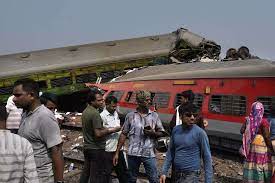Railway Board Chairman Requests Staff Not To Cut Corners During High-Level Safety Meeting After Balasore Train Accident
Anil Kumar Lahoti, Chairman of the Railway Board (CRB), stressed that staff members shouldn’t regularly use time-saving techniques in the middle of speculations about a potential shortcut that may have prevented the fatal Balasore train tragedy.
Lahoti addressed the General Managers and Divisional Rail Managers of Indian Railways at a high-level safety meeting. Sources claim that the meeting went on far into Tuesday night and lasted for many hours.
An officer who was actively participating in the discussion in his official capacity stated, “CRB asked to follow the guidelines and to retain safety, a top priority.
The railway catastrophe in Odisha, which claimed 288 lives and wounded more than 900 others, prompted the need for the high-level safety conference.
The Central Bureau of Investigation (CBI) has started its inquiry into the issue, but officials are still tackling the difficult process of corpse identification.
The Chairman of the Railway Board stressed the importance of safety in his discussion with the workforce and underscored that everyone receiving compensation from the railroads is accountable for safety.
He instructed the Divisional Railway Managers (DRMs) in attendance to speak with each employee and reassure them about any blocks or disconnections that could be necessary for construction, maintenance, or repair work.
The Chairman further emphasized the need of efficient coordination and communication in order to guarantee the security of operations during such events.
The need for “blocks” poses a significant difficulty for maintenance, according to experts.
These barriers are put in place to guarantee a stop in rail traffic and act as a formal warning to concerned officials and workers, advising them not to operate trains on a certain track or segment.
While this precaution helps to reduce accidents, it also has some kind of influence on punctuality. In certain circumstances, trains may be diverted or delayed; in others, they may even be cancelled.
The lengthy safety presentation included recommendations for elders specifically.
“All Senior officials from HQ have been requested to relocate to the field and spend time with the field employees in order to better understand the systems they are using, their knowledge of how things function, whether it is accurate or not, and what needs to be corrected immediately. This often occurs, the officer remarked.
We typically communicate with our field personnel, but we have also been urged to step up this effort, he said.
A directive was given on the inter-zonal and inter-divisional audits at the meeting. It was highlighted that these audits should happen more often. To make sure that all needed checks and regulations are in place, a comprehensive assessment is necessary.
According to a trustworthy source, the divisions have been told to present their Inter-zonal audit plans with the relevant zones by Wednesday evening.
“Safety meetings are regular gatherings that take place after some time. These meetings may, however, also be called after a similar accident. Following the train tragedy, the meeting on Tuesday was crucial, a Railway Board official says.
The Balasore railway disaster is the subject of CRS and CBI probes and investigations, respectively. More than 50 railroad employees from the station, the zone, and both trains were summoned to produce their records on Monday and Tuesday.
According to authorities, the CRS will also check to see whether any repairs were made without following the correct protocol.







